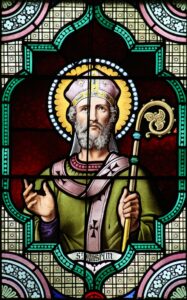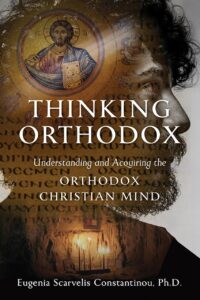What we’re talking about is Anselm’s misunderstanding of how Christ saves us – which, combined with a little mistranslation by Saint Jerome, led finally to Protestantism. But a lot happened in between, and we’re getting ‘way ahead of the story.
Why this topic today? Because of this next Sunday’s Epistle reading (Galatians 2:16-20), which in most English translations contains Saint Jerome’s error. Beware lest it make you a Protestant!
What follows now is a great oversimplification of both theology and history. If any here present think I’ve “over-oversimplified” or have made errors, please comment below. I’m no professional theologian or historian.
It’s simplest to take everything in historical order:
Saint Jerome
 Back to the Fifth Century. Jerome was kind of crotchety in his latter years (you should read the letters he sent to Saint Augustine!), but he was a saint, a good and holy man, and an eminent scholar. He had settled in Palestine near Bethlehem, but had come from Italy and had spent much time in Rome. So he took on the great and worthy project of translating the Holy Scriptures into Latin – called the Vulgate [popular language] Bible, the standard Bible in the Roman Catholic Church till 1979. While translating, he made a small error.
Back to the Fifth Century. Jerome was kind of crotchety in his latter years (you should read the letters he sent to Saint Augustine!), but he was a saint, a good and holy man, and an eminent scholar. He had settled in Palestine near Bethlehem, but had come from Italy and had spent much time in Rome. So he took on the great and worthy project of translating the Holy Scriptures into Latin – called the Vulgate [popular language] Bible, the standard Bible in the Roman Catholic Church till 1979. While translating, he made a small error.
Icons by permission of Saint Isaac’s Skete at skete.com
I hate to go into linguistics so early in this Post, for fear of losing you, but I think we must look at Jerome’s mistranslation. Be gentle with him. We all make mistakes, do we not? and he could not possibly have imagined what this one error would lead to.
What Saint Paul wrote in Galatians 2:16 was: “A man is made righteous [fδικαιοῦται – from dikaiosune / δικαιοσύνη / “righteousness”, in the Eastern Fathers’ understanding] not by works of the Law but by the faith of Jesus Christ [διὰ πίστεως Ἰησοῦ Χριστοῦ].“
 Jerome translated it like this:”We are justified [a Latin legal term meaning to be declared innocent, absolved] by faith in Jesus Christ.” * If this seems a trivial mistake, just wait 1100 years.
Jerome translated it like this:”We are justified [a Latin legal term meaning to be declared innocent, absolved] by faith in Jesus Christ.” * If this seems a trivial mistake, just wait 1100 years.
- It is distressing to find this mistranslation, uncorrected, in many English Bibles used in the Orthodox Church, both at church and online.
I couldn’t resist including this painting of old Jerome. Guido Remi, 1634. (Public Domain) I hope the angel is bringing him some clothing! Compare it to the holy icon above. The Western Renaissance took some strange turns – in reaction to the harshness of Saint Anselm?
Saint Anselm
 Six hundred years after Jerome, Anselm (Archbishop of Canterbury, AD 1034-1109), wrote his book Cur Deus Homo? (“Why [did] God [become[ Man?”) The topic was: How did Christ save us?
Six hundred years after Jerome, Anselm (Archbishop of Canterbury, AD 1034-1109), wrote his book Cur Deus Homo? (“Why [did] God [become[ Man?”) The topic was: How did Christ save us?
late 19th c English glass window, craftsman unknown (at Wikimedia)
Eastern Orthodoxy consistently has emphasized that Christ did so by entering into death and conquering Satan and death, then rising again victorious. Christ the Victor. In the text of his Divine Liturgy, Saint Basil the Great saw Christ also as the Victim *, who by His death offered “a ransom to death“, based on the Lord’s words: “the Son of Man came… to give His life as a ransom for many.” Matthew 20:28, Mark 10:45
- Not meant in the popular sense. “Victim” here is a theological term referring to Christ’s voluntary sacrifice.
In early centuries Western Christians saw Christ chiefly as Victim, who by His sacrificial death paid the ransom to Satan the “kidnapper”. In both these approaches Christ offered His suffering and death to the Father out of love and obedience.
However, Anselm took the the idea of Christ as Victim in a new direction. He taught that by His death Christ paid the ransom to God the Father. He reasoned that imperfect man owed God a perfect life. Since we could not pay that debt, “justice” required that the Father condemn us to hell. However Jesus Christ, who as God is perfect, became Man so that by His death He could offer the perfect sacrifice. Now that the requirements of justice have been satisfied, the Father may allow us to go to heaven. This was called the “Satisfaction” theory of Atonement – i.e., God’s justice had to be “satisfied”. In some later versions it was God’s “dignity” that had to be satisfied.
Where did Anselm get this? Probably from the pattern of feudal society, where an offender was required to make satisfaction, recompense, to the one offended according to that person’s status. And since God is infinite, finite mankind had no hope.
But where in Holy Scripture is it written that Christ had to placate God the Father? I hope you can see how dreadful the Satisfaction theory is. It turned God the Father into an impassive Judge who is limited by some arbitrary law of justice. That’s not the Gospel! Christ came to show us that the Father loves us without condition. He is the father of the Prodigal Son who instead of requiring “justice”, ran out to forgive his son before his son could even apologize. We pray not “Our Judge who art in heaven” but “Our Father who art in heaven.”
Nevertheless Western Christians bought into Anselm’s Satisfaction theory. He is officially a Roman Catholic “Doctor of the Church”, that is, considered one of the Fathers.
His doctrine led…, well, it led to the little girl who asked “Why does Jesus love us, but God hates us?” Kyrie eleison.
In the medieval West, the question remained: How do we “tap into” Christ’s perfect Sacrifice, so that we can actually enter heaven? Roman Catholicism came up with a legal system of drawing on Christ’s “merits”, which is so complicated that I don’t want to talk about it. Actually I don’t understand it. But it led to Indulgences and prayers said and good deeds performed in order to gain days off of Purgatory – all granted by the powers of the Papacy. Salvation by “works”.
Martin Luther
 Five centuries after Anselm, Luther (1483-1546), frustrated by all this legalism, discovered a much simpler approach.
Five centuries after Anselm, Luther (1483-1546), frustrated by all this legalism, discovered a much simpler approach.
by Lucas Cranach the Elder, 1529 (from Wikimedia)
Luther was a well-intentioned (though imperfect) man, who accomplished some necessary (and some unnecessary) reforms. For my more elaborated look at him see:
https://frbillsorthodoxblog.com/2017/10/20/35-the-protestant-reformation-how-luther-was-right-and-why-he-went-wrong-a-case-study-in-what-happens-when-you-turn-away-from-the-churchs-tradition/
https://frbillsorthodoxblog.com/2017/10/27/36-protestant-reformation-part-2-how-luther-was-right-and-why-he-went-wrong/
How actually does Christ save us? Here Luther made some big mistakes:
1 He accepted Anselm’s non-Scriptural Satisfaction theory of the Atonement. Everybody in the West took it for granted, so it never occurred to him to think otherwise. This was odd, however, because Luther taught that Scripture was the only source of the Christian faith: “Sola Scriptura”.
2 He focused his approach to salvation essentially on one Scripture verse, and unfortunately it was the verse Jerome had mistranslated. Protestantism ever since has been built on that error.
The Protestant Doctrine of Justification by Faith Alone
“We are justified [declared innocent, absolved] by faith in Jesus Christ.”
Luther took this mistranslation to mean that all we have to do to be declared legally innocent in God’s sight (even though we’re actually still guilty), is to have faith in Jesus Christ’s saving death, and then we “get out of jail free” (to put it crudely) and can “go straight to heaven”. We can still hear this on “The Lutheran Hour” in Milwaukee: “Jesus paid the price of our sins. Now God forgives us, so we won’t have to go to hell, and we can go to heaven” Simple! Too simple.

And when Paul wrote that “we are not justified by works of the Law” (referring to the Old Testament rules and regulations), Luther therefore took that to mean that “good works” – our actions – have nothing to do with our salvation. He even went so far as to add a word to his German translation, so that it read “we are justified by faith alone.” (A little addition to “Sola Scriptura”…)
Other verses, like Romans 10:9, taken out of context, would even suggest that all that’s necessary for salvation is intellectual belief.
No. This is completely inconsistent with the rest of the New Testament, where It’s clear that our actions, our “good works” have everything to do with our salvation. Read the Gospels, and note what Jesus said – Matthew 25:31-46, for just one example. Read the first chapter of the Epistle of James, who wrote that “faith without works is dead”. James 1:17 Luther said James was an “epistle of straw” and wished he could throw it out of the Bible. Well!
If any think I have misunderstood Luther, please comment below. However, I was once raked over the coals by a conservative Lutheran pastor (when one of his members wanted to join Saint Nicholas, Cedarburg) because I didn’t believe this. I almost thought he might come to blows.
Now, in practice, many Protestants are full of “good works”, sometimes more than us Orthodox. However, they officially believe these have no connection with their salvation.
What has Luther’s doctrine led to? Two extreme examples:
1 The guy I called on in our county jail, who had broken all the Ten Commandments except murder (so far as I knew). I asked him “Don’t you feel bad about this? guilty?” “No!” he cried, “Jesus forgives me!”
2 The man who told me how his church “saved” people: They would ask visitors, “Would you like to be sure you’re going to heaven? Just sign this statement of faith in Jesus, and heaven is guaranteed!” The man asked me what I thought of that. I was so flummoxed all I could say was “We don’t do it exactly that way…” (He, by the way, is now Orthodox – where our only guarantee is that God loves us. The rest is up to us. See 1 Corinthians 9:27).
We need to get this right. With the rise of the evangelical movement, this false teaching is very much “in the air” in our culture. With Protestants and us ex-Protestants, it’s almost part of our DNA. After thirty two years Orthodox, I still have to fight it off sometimes: Jerome’s innocent error, Anselm’s false teaching, and Martin Luther’s big mistake.
So now, let’s go positive with this Sunday’s Epistle reading. Consistent with the rest of the New Testament, here is what Saint Paul really said:
“We are made righteous by the faith of Jesus Christ”.
Here’s the whole picture: We are loved by God, whether we have faith or not. But to be “set right” with Him does not consist of just escaping hell. It means to “become righteous”, to actually become “innocent” (not just get off the hook), to be remade into the kind of good holy people God created us to be. This requires a very long process of personal growth. And to accomplish that we must gain “the faith of Jesus Christ”.
 As Dr Eugenia Constantinou writes in her book Thinking Orthodox (see our Post of three weeks ago) we need to acquire the Phronema, the mindset and the “lifestyle” of Jesus Christ, the character of Jesus Christ. Thereby we will also gain His faith.
As Dr Eugenia Constantinou writes in her book Thinking Orthodox (see our Post of three weeks ago) we need to acquire the Phronema, the mindset and the “lifestyle” of Jesus Christ, the character of Jesus Christ. Thereby we will also gain His faith.
What was “the faith of Jesus Christ”? Total trust in God His Father – through thick and thin, good times and bad, when He was being tempted and when Satan had withdrawn. A faith which carried Him through childhood into adulthood, through the hills of Galilee and up to Judaea, through Gethsemane and onto the Cross, and out into the Resurrection and Ascension – trusting His Father, doing HIs Father’s will every step of the way.
That’s the faith we need to acquire. That’s the faith that will carry us Home.
Is that possible for us? Yes, but it’s a project that begins in this life and, with God’s help and if we haven’t given up, continues into Everlasting Life. To paraphrase the Protestant hymn, maybe when “we’ve been there ten thousand years”, we’ll have made a good start.
How can we acquire “the faith of Jesus Christ”?
The same way He did. This sounds an odd thing to say, but Jesus “was not born with a silver spoon in His mouth”. He could have been, but He chose not to. He chose to struggle for it, work at it just as we must, in order to lead our way.
We can’t possibly imagine the inner life of the God Man, but the New Testament gives a few hints. For example:
 The Virgin Mary remembered how “Jesus grew in wisdom and stature, and in favor with God and man.” Luke 2:52 That is, He did not emerge from her womb knowing all things. He had to grow into Who He was, just as we all do. Already by age twelve, He knew – on a twelve year old’s level.
The Virgin Mary remembered how “Jesus grew in wisdom and stature, and in favor with God and man.” Luke 2:52 That is, He did not emerge from her womb knowing all things. He had to grow into Who He was, just as we all do. Already by age twelve, He knew – on a twelve year old’s level.
He chose to struggle for it, as we all must: “For we do not have a high priest who is unable to sympathize with our weaknesses, but one who in every respect has been tempted as we are, yet without sin.” Hebrews 4:15 “In every respect” like us. Jesus was a little boy. Think of it: Jesus was a teenager, which all that entailed. We can scarcely begin to imagine what horrible cosmic temptations God allowed Himself to be subjected to. Luke 4:1-15 suggests what it was like.
So exactly how did He gain and retain His solid faith? By being immersed in the Holy Community as a faithful Jew. From the time of His Circumcision, He was shaped by the Holy Tradition, the Scriptures, worship, prayer, knowing and loving the faithful people of God, treasuring and learning from the stories of God’s faithful holy ones of past times, by caring for the needy – and supported from the beginning by a solid faithful Family life at home. That’s how Christ’s faith was shaped and strengthened throughout His life.
So with us. To acquire the faith of Jesus Christ, from the time of our Baptism we also should be immersed in and shaped by the new Holy Community, the Church, by the Tradition, by growing up in a faithful family, by the Holy Scriptures, the Divine Liturgy, receiving the Eucharist and the sacraments, prayer, by caring for the needy, by fellowship with our faithful brothers and sisters on earth and on high, knowing and loving the stories of the saints.
It requires struggle, effort, work (sorry, Mr Luther) – all with God’s help. The Orthodox doctrine is “Synergy”: God provides everything, but we must cooperate with Him.
And so we will gain the faith of Jesus Christ.
Conclusion
Anselm was wrong. Don’t ever believe that Our Father is an impassive tyrant. God “is good and loves mankind”.
Jerome: When you read or hear his mistake, correct it in your mind!
Luther was right: Of course we need to have faith in Jesus Christ, to trust our Savior. But he was also wrong. There’s a lot more to it than he thought. Brothers and sisters, “Work out your salvation with fear and trembling”. Philippians 2:12
Next Week: This week was heavy. Next week we’ll just tell Some Little Stories about some Great Men.
Week after Next: The Saint who almost made it
I just read the chapter 3 in Thinking Orthodox where Dr Constantinou reviews Western Christian Tradition, very illuminating.
Indeed. Dr Jeannie’s writing is remarkably clear and insightful.
P.S. about a week later. Since I’m no Greek scholar, I’ve had to ponder. If in Greek “love of Christ” can mean either His love for God or His love for us, then would “faith of Christ” mean His faith in God or His faith in us? for us? I don’t quite understand the latter. Can you clarify?
Although I agree with your central point, I don’t think Jerome’s translation is wrong. It is extremely literal, and could also be translated as “we are made righteous by the Faith of Jesus Christ.” He manages to find an exact equivalent of every single word. However, in Greek, the word for faith is similar to love, in that “the love of God” can mean our love for God, or God’s love for us. So I don’t know if the faith of Christ is actually the right translation.